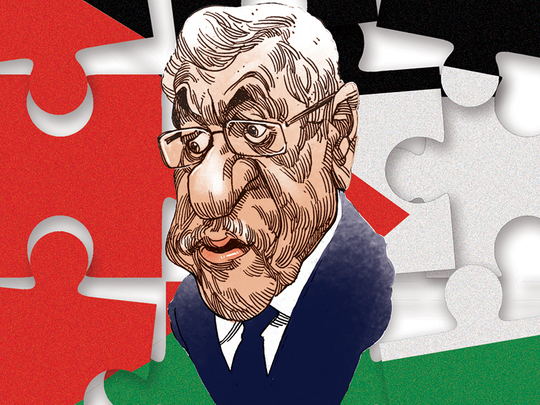
The Palestinian situation has never been so bleak and so miserable. President Mahmoud Abbas of the Palestinian National Authority (PNA) has been unable to make a breakthrough in almost every crucial file involving his people’s national cause since he took over in 2005, succeeding the avuncular leader Yasser Arafat. Now in his 80s, Abbas is well aware that various undercurrents are in motion to prepare the ground for his replacement. He has resisted attempts to name a successor and recently warned his close allies, the newly-formed Arab Quartet, of interfering in Palestinian affairs.
The challenges facing Abbas are multi-layered — he has been discredited by the hardline Israeli leadership and his attempts to re-launch stalled peace negotiations with Israel have been rebuffed by an intransigent Israeli Prime Minister Benjamin Netanyahu. In addition, he has been abandoned by the Obama administration, who had given up on initiatives to bring the two sides together and failed to stop the Netanyahu government from expanding its illegal colony activities in the West Bank and occupied East Jerusalem.
Moreover, Abbas’ international crusades at the United Nations and other forums have done little to improve the lot of the Palestinians or put real pressure on Israel to end its 50-year occupation. And there is the complicated challenge of Hamas, which expelled Fatah from Gaza in 2006 and has since refused to hand over power as a price for Palestinian internal reconciliation. All Arab initiatives to end the rift have fallen apart and Abbas is partly to blame. He often backs down at the last minute from taking a stand. He has been criticised by his closest aides for his hesitation to raise the ante with Israel at crucial moments.
The PNA has been suffering from endemic financial woes for years, raising the level of indignation among hundreds of thousands of Palestinians on its payroll. Even among traditional Arab allies, such as Saudi Arabia, Egypt and Jordan, Abbas has failed to maintain common trust and openness.
The disastrous aftermath of the Arab Spring has marginalised the Palestinian cause both regionally and internationally. Netanyahu understood this early on and set out to sideline the PNA and embark on a grand scheme to colonise what remains of the West Bank. This was not Abbas’ doing, but he also failed to realise that geopolitical realities require that he adapts as well. His international gestures were shabby and limited in their scope and outcome.
And recently Abbas is believed to have pulled the strings to force Ramallah courts to postpone the October 8 vote in municipal elections in the West Bank and Gaza for fear that his divided Fatah movement will lose big time to Hamas. His gambit has worked for now, but Palestinian frustration is on the increase as seen in the latest spell of violence in occupied Jerusalem and the West Bank.
Seeing as this is an election year in the US, Abbas can hardly count on American help to provide him with a political lifeline. The Europeans can hardly do anything. The French initiative has broken apart and a planned meeting in Moscow between him and Netanyahu will hardly change the latter’s position. He is getting isolated both regionally and internationally. And he is running out of options. The Arab Quartet wants him to reconcile with his bitter enemy, former Fatah leader Mohammad Dahlan, who is seen by some as a potential successor to Abbas. He is under pressure, but it is unlikely that he will submit anytime soon.
Palestinian internal divisions have been the worst national catastrophe to happen under Abbas. He is not entirely to blame. Hamas is hungry for power and its agenda runs counter to long-term Palestinian interests. But Abbas lacks the charisma and leadership of Arafat. He has failed to make use of many initiatives to end the rift, even if that meant finding a new political formula to rule over the Palestinians. He has failed to revive and reform the Palestine Liberation Organisation and ignored pleas to hold the National Palestinian Council (PNC) to involve all Palestinians in decisions that affect their future and their national struggle for liberation.
To assume that he can decide the future of Palestinians on his own is ludicrous. He has to give his people hope that a shared destiny means a new kind of leadership. His conundrum can be understood. Dahlan is a controversial figure and his assumption of leadership in the future could divide Palestinians even further. But that is a decision for the Palestinians to make; at the polls and in a democratic manner. He can’t run things as he did in the past decade. The reality of occupation and of regional and international affairs dictates that he trusts his people to find a new path.
Osama Al Sharif is a journalist and political commentator based in Amman.










